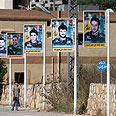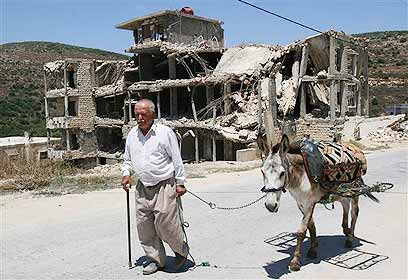
Photos of Lebanese war casualties
צילום: איי פי
Hizbullah’s ‘divine victory’ in ruins
Despite Shiite group’s propaganda efforts, criticism of its conduct during Last summer’s war and its aftermath filtering through. ‘When you have a criminal neighbor such as Israel, you must think a hundred times before provoking it,’ Beirut resident says
“Tell me, do you know what this means?” a Shiite from south Beirut asks a reporter from the Al-Awan news website as he makes the victory sign with his two fingers. “It means that we have only two buildings still standing.”
Shoal Rada’s macabre joke demonstrates the general atmosphere in Lebanon in the aftermath of the war with Israel, despite Hizbullah’s continuous attempts to present last summer’s conflict as a “divine victory”.
Unbiased reports on the situation in Lebanon are few and far between, as Hizbullah representatives accompany each and every journalist to make sure no reports and photos that may be detrimental to the organization’s propaganda efforts are published.
However, some criticism against Hizbullah and the Lebanese government does filter through every now and again.

Devastation in south Lebanon (Photo: AP)
“I don’t understand the benefit of this war,” says Rada, who works as a driver. “When you have a criminal neighbor such as Israel, you must think a hundred times before provoking it.
“Hizbullah should have expected this outcome. What’s heroic about having a million refugees? Believe me, if they don’t pay reparations to all those who have lost their homes in the war, the Shiites will rise up against them and spit at them,” he says.
'They want to drag the country into chaos'
Muhammad, a university professor from west Beirut, says “I was against Hizbullah’s attack (on Israel), but when Israel attacked – I supported Hizbullah. Now I am glad that the UNIFIL forces are here. What would become us, the secular Muslims, if we would have had to face Hizullah on our own?”
Words of condemnation and fear of another war with Israel can even be heard in Bint Jbeil, considered to be the Shiite capital in south Lebanon.
“We will never really be compensated in full; the destruction has turned Bint Jbeil upside down,” Fatma Baidun tells an Asharq Al-Awsat reporter. “A year has passed since the war, and the situation remains very difficult. There is no one who can help us.”
Dozens of structures suspected of containing bomb duds are marked with red tape, which is not removed until the buildings are ‘cleansed”.
The duds spread out in the area also make it difficult for farmers to cultivate their lands.
“I’ve lost millions and haven’t received any compensation,” says Abbas Ibrahim, a 60-year-old local farmer. “All of our leaders are liars. They make promises, but destroy homes, just like the leaders of the people of Palestine.”
Residents from other south Lebanon towns, such as Marj Ayun and el-Hiam, are also finding it hard to deal with the new reality.
“People who left the area last July due to the war have not returned because of the cluster-bomb duds,” Hadj Muhammad tells a reporter from the Saudi newspaper –Al-Watan.
“The recent attack (against a Spanish UNIFIL battalion in south Lebanon) has killed out hope that life here will ever return to normal,” he says.
During a recent meeting of about 150 Shiite academics at the Commodore Hotel in Beirut, participants called on Hizbullah to halt its attacks against Lebanese government institutions and authorities.
“Hizbullah and the opposition have lost their credibility,” says Hamad Sayef, who took part in the conference. “They want to drag the country into chaos on behalf of the Syrian regime. Hizbullah must stand by the government in its war against the Fatah el-Islam militia in Tripoli.”










